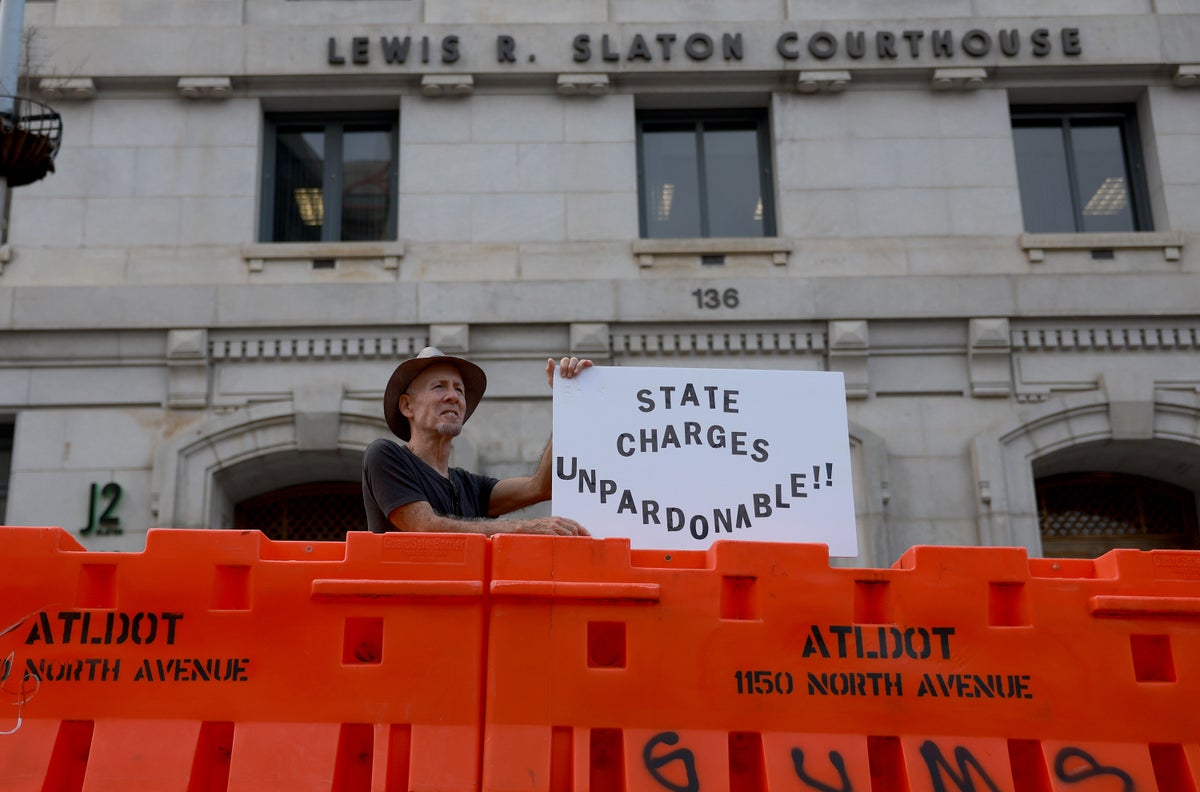
The office of Fulton County District Attorney Fani Willis in Georgia has notified at least two witnesses to appear next week before a grand jury investigating Donald Trump’s efforts to overturn election results in the state, the strongest indication yet that prosecutors are preparing to issue indictments in the coming days.
Prosecutors will begin to present the case to jurors early next week.
Former Republican Lt Governor Geoff Duncan said he has been requested to appear on Tuesday, 15 August.
“I did just receive notification to appear on Tuesday morning at the Fulton County grand jury and I certainly will be there to do my part in recounting the facts,” he told CNN. “I have no expectations as to the questions, and I’ll certainly answer whatever questions are put in front of me.”
Journalist George Chidi also has announced that he is preparing to testify on Tuesday.
The case is the culmination of a wide-ranging investigation over the last two years following the former president’s pressure campaign targeting state officials to reject the results of the 2020 presidential election in the state.
Ms Willis opened an investigation shortly after news of Mr Trump’s call to Georgia’s Secretary of State Brad Raffensperger, the state’s top elections official, who was pressed to find “11,870 votes” – just enough needed for then-President Trump to beat Joe Biden in the state.
A special grand jury previously heard testimony from 75 witnesses, including aides and former attorneys to Mr Trump. That jury concluded its report in January with recommendations for state prosecutors to bring charges that will soon be reviewed by the newly impaneled grand jury.
The investigation is among several facing the former president, who was separately charged with three criminal conspiracies and obstruction in a federal case stemming from the US Department of Justice special counsel probe into his attempts to subvert the election outcome.
Last year, Ms Willis’s office sent letters warning several people – including Rudy Giuliani and a slate of so-called “alternate” electors loyal to Mr Trump – that they could face charges in the case.
She also may be considering a wider set of charges that Ms Willis has made a career out of bringing against dozens of others.
The state’s anti-racketeering RICO statute – typically used to break up organised crime – has been used by her office in indictments against more than two dozen people connected to a sprawling Atlanta hip-hop empire, 38 alleged gang members, and 25 educators accused of cheating Atlanta’s public school system.
The RICO Act allows prosecutors to bring charges against multiple people that they believe committed separate crimes while working toward a common goal.
A grand jury was sworn in to hear the case last month. Jurors have convened on Mondays and Tuesdays.
After a case is presented, members of the grand jury convene to deliberate the case and decide whether to vote for a “true bill” or a “no bill” indictment, the former meaning that there is probable cause to believe a person committed a crime. A “no bill” means jurors did not believe a person committed a crime or that there is not enough evidence to indict them.
An indictment is then presented in open court.
Mr Trump has repeatedly denied wrongdoing, characterising the multiple criminal indictments against him in several jurisdictions as politically motivated “witch hunts” while lashing out at the Democratic elected prosecutors in Atlanta and New York City – both of whom are Black – as “racist”.
News of the upcoming grand jury testimony came as Mr Trump arrived at the Iowa State Fair on Saturday as he campaigns for the 2024 Republican nomination for president.
In a brief appearance to supporters, he falsely claimed that he received “millions and millions” of more votes than Mr Biden in 2020 as a group of his congressional surrogates – including Byron Donalds and Matt Gaetz – rallied alongside him in a crowded tent.
The former president must comply with the terms of a federal court-ordered protective order that prohibits Mr Trump from sharing sensitive materials – including grand jury transcripts, witness interview records and other documents that could poison a pool of potential jurors – as he prepares to face a trial in the federal case early next year.
Asked whether he will abide by the terms of the order during his appearance in Iowa on Saturday, he said “we’ll have to take a look” at it, then once again called the charges against him “election interference” from Mr Biden.
Asked whether he intended to overturn the 2020 election, he said: “You know the answer.”







